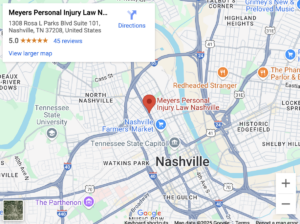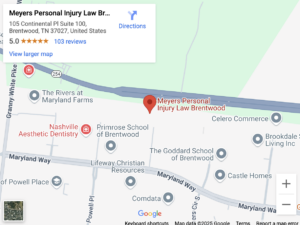What Are My Rights if a Valet Wrecks My Vehicle in Tennessee?
Meyers Personal Injury Law | February 6, 2026 | Personal Injury
Handing your car keys to a valet should make life easier. It shouldn’t create a legal headache. When a valet crashes your vehicle, you may be left dealing with property damage, insurance disputes, and uncertainty about who is responsible. Under Tennessee law, several parties may share liability, depending on how the accident happened and who […]
Read more
What Happens if I Get Injured at Ryman Auditorium in Nashville?
Meyers Personal Injury Law | February 5, 2026 | Personal Injury
Ryman Auditorium is one of Nashville’s most famous landmarks. Known as the “Mother Church of Country Music,” it hosts concerts, comedy shows, and special events year-round. Thousands of locals and tourists visit every week. With large crowds, steep stairs, and historic features, accidents can happen. If you were hurt at Ryman Auditorium, you may be […]
Read more
How Much Does a Lawyer Cost in Nashville, TN?
Meyers Personal Injury Law | February 3, 2026 | Personal Injury
If you have been hurt in an accident, you may be dealing with doctor visits, time off work, and a lot of uncertainty. It is completely normal to wonder, “Can I even afford a lawyer?” In Nashville, Tennessee, most personal injury lawyers offer fee options that make it possible to get help without paying anything […]
Read more
If Someone Dies in a Car Accident That Is My Fault, What Can Happen to Me?
Meyers Personal Injury Law | January 30, 2026 | Wrongful Death
A fatal car accident changes lives forever. If you were involved in a car accident where someone died, you may be facing overwhelming grief, shock, and fear about what happens next. Understanding the legal consequences can help you protect your rights and take the correct next steps, especially if you may be at fault. Here […]
Read more
Which Is More Dangerous: Texting and Driving or Drunk Driving in Tennessee?
Meyers Personal Injury Law | January 26, 2026 | Car Accidents
Car accidents remain a serious problem across Tennessee. Among the most common causes are texting while driving and drunk driving—two behaviors that significantly impair a driver’s ability to operate a vehicle safely. While both are widely recognized as dangerous, people often debate which one poses the greater risk. Understanding why they are compared—and how they […]
Read more
What Are Nerve Damage Lawsuit Payouts in Tennessee? Understanding Compensation Factors and Potential Awards
Meyers Personal Injury Law | January 21, 2026 | Personal Injury
Nerve damage is one of the most serious injuries a person can suffer after an accident. Unlike broken bones or soft tissue injuries, nerve damage often causes long-term or permanent symptoms that affect daily life, mobility, and the ability to work. Because of this, nerve damage claims can involve substantial compensation—but payouts vary widely depending […]
Read more
Suffering From Knee Pain After an Accident? Here’s What You Need To Know
Meyers Personal Injury Law | January 15, 2026 | Personal Injury
Knee pain after an accident can signal a serious injury, even if symptoms do not appear right away. Because the knee is a complex joint, trauma from a crash, fall, or workplace incident can lead to lasting pain, mobility issues, and missed work. This article explains the signs of knee injuries, why prompt medical care […]
Read more
Should I Hire a Lawyer After a Car Accident That Wasn’t My Fault?
Meyers Personal Injury Law | January 12, 2026 | Car Accidents
After a car accident that was not your fault, you may feel overwhelmed but unsure whether hiring a lawyer is really necessary. Insurance companies may tell you the process is simple, or that you can handle the claim on your own. In reality, even a “clear-cut” accident can become complicated quickly. Understanding when to seek […]
Read more
Symptoms of a Broken Tailbone
Meyers Personal Injury Law | January 9, 2026 | Personal Injury
A broken tailbone, also called a coccyx fracture, can cause lingering pain that interferes with everyday activities. This type of personal injury often occurs after a fall, a sports-related impact, or a motor vehicle accident. Because symptoms may not be immediately apparent, people sometimes delay seeking treatment. If you were injured in an accident in […]
Read more
5 Situations That Require a Personal Injury Lawyer
Meyers Personal Injury Law | January 5, 2026 | Personal Injury
Personal injury lawyers handle a wide range of cases involving injuries caused by another party’s negligence or wrongful conduct. In general, having legal representation can be beneficial anytime you’re hurt because someone else failed to act responsibly. That said, certain situations make hiring a personal injury lawyer especially important. In these cases, an experienced attorney […]
Read more



